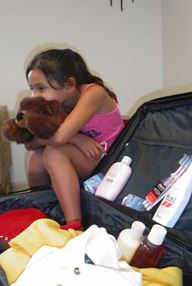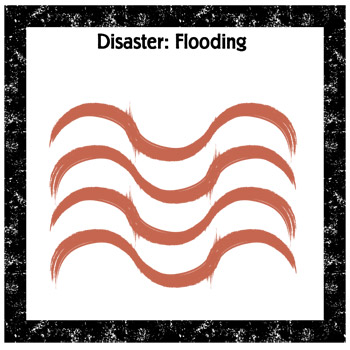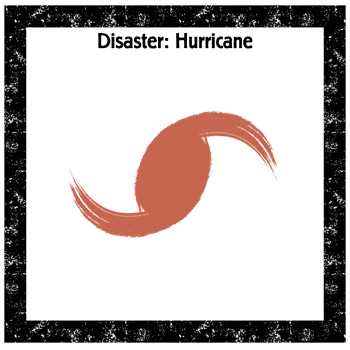Emergency Care
 A “care package” from NPRA often elicits the question, “ Do I have to give it back?” from an incredulous foster child (NPRA staff member's daughter pictured in order to protect identity of foster children).
A “care package” from NPRA often elicits the question, “ Do I have to give it back?” from an incredulous foster child (NPRA staff member's daughter pictured in order to protect identity of foster children).
The physical environment on the reservations we support is often harsh, giving rise to a wide range of environmental disasters such as floods, forest fires, blizzards, ice storms, and more. Some communities also experience acute or chronic contaminated-water emergencies. In the United States, 90,000 Native Americans are homeless and 40% of Native Americans live in substandard, overcrowded housing. The typical wait time for tribal housing assistance is three years or more.
When unexpected weather or environmental emergencies arise, our Disaster Relief service helps our reservation Program Partners assist communities in need and families who have been displaced.
NRPA also assists homeless shelters on the reservations, along with shelters for the aged, disabled, veterans and others, as well as children in trauma.
PWNA has responded to emergencies for tribes outside our normal service area as well, including the Bad River Tribe in Wisconsin, the United Houma Nation in Louisiana, and Lumbee Tribe in North Carolina.
Bad River Tribe

Aid Requested: On July 18, emergency aid was requested in the form of staple foods and cleaning supplies to assist the families with clean up and loss of food supplies due to power outages.
Disaster Response: We coordinated delivery of the requested aid to the Bad River Community Center, Odanah, Wisconsin, providing food and cleaning supplies worth over $120,000 in the 66 pallets provided from PWNA’s Arizona and South Dakota distribution centers:
• more than 100,000 ready-to-eat meals shipped
• almost 60,000 pounds of cleaning supplies shipped, including bleach, wipes, soap and sanitizers, along with emergency blankets and personal hygiene items
United Houma Nation

Aid Requested: On August 19, emergency aid was requested in the form of water, nonperishable food, personal hygiene items and cleaning products.
Disaster Response: $1,200,000 worth of food and cleaning supplies in 84 pallets:
• Over 36,000 pounds of food shipped, including tuna, MREs (ready-to-eat meals), peanut butter, soda, crackers and energy drinks
• More than 86,000 pounds of cleaning supplies shipped, including bleach, wipes, soap, sanitizers, latex gloves, trash bags and buckets, along with emergency and baby blankets, personal hygiene items and over-the-counter health products such as ointments and bandages
Lumbee Tribe

Aid Requested: On Oct. 11, emergency aid was requested in the form of cleaning supplies and personal hygiene kits, to immediately assist families with clean up and displacement from their homes.
Disaster Response: $654,716 worth of supplies, including all 144 of the gaylord pallets:
• 25,313 pounds of food shipped, including meals ready-to-eat (MREs) and snacks
• 82,000 pounds of supplies for cleaning and personal hygiene shipped
Service category: Emergency (see other Emergency service pages: Winter Boxes and Winter Fuel.)
Here are a few examples of how the NPRA Emergency service touches the lives of Native Americans:
"Chii miigwech- Thank you for relief sent to the shore of Lake Superior, experiencing floods that has taken out roads and bridges and is isolating families, destroyed houses and took the resources of food and necessities for these families. Thank you for sending relief goods. They were urgently needed and will be greatly appreciated."
"Every product was a great quality product and everything sent was needed and appreciated. The blankets, in particular, were so appreciated by the Elders."